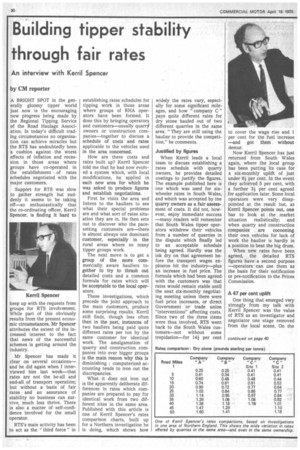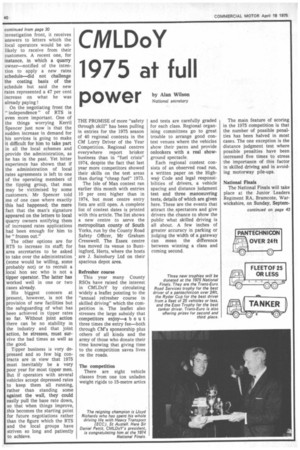Building tipper stability through fair rates
Page 32

Page 42

If you've noticed an error in this article please click here to report it so we can fix it.
An interview with Kerril Spencer by CM reporter
A BRIGHT SPOT in the generally gloomy tipper world just now is the encouraging new progress being made by the Regional Tipping Service of the Road Haulage Association. In today's difficult trading circumstances no organisation can achieve miracles but the RTS has undoubtedly been a cushion against the worst effects of inflation and recession in those areas where groups have co-operated in the establishment of rates schedules negotiated with the major customers.
Support for RTS was slow to gather strength but suddenly it seems to be taking off-so enthusiastically that the co-ordinating officer, Kerril Spencer, is finding it hard to keep up with the requests from groups for RTS involvement. While part of this obviously results from the present economic circumstances, Mr Spencer attributes the extent of the increased interest to the fact that news of the successful schemes is getting around the industry.
Mr Spencer has made it clear on several occasionsand he did again when I interviewed him last week-that rates are not the be-all and end-all of transport operation; but without a basis of fair rates and an assurance of stability no business can survive, much less thrive. There is also a matter of self-confidence involved for the small operator.
RTS's main activity has been to act as the " third force" in establishing rates schedules for tipping work in those areas where groups of RHA operators have been formed. It does this by bringing operators and customers-usually quarry owners or construction companies-together to discuss a schedule of costs and rates applicable to the vehicles used in the area concerned.
How are these costs and rates built up? Kerril Spencer told me that he had now evolved a system which, with local modifications, he applied in each new area for which he was asked to produce figures and establish negotiations.
First he visits the area and listens to the hauliers to see what their special problems are and what sort of rates situation they are in. He then sets out to discover who the pacesetting customers are-there is almost always one dominant customer, especially in the rural areas where so many tipper groups work.
The next move is to get a group of the more commercially aware hauliers together to try to thrash out detailed costs and a common formula for rates which will be acceptable to the local operators.
These investigations, which precede the joint approach to the main customers, produce some surprising results. Kerril still finds, though less often than in the past, instances of two hauliers being paid quite different rates per ton by the same customer for identical work. The amalgamation of quarry and construction companies into ever bigger groups is the main reason why this is diminishing : computerised accounting tends to iron out the discrepancies.
What it does not iron out is the apparently deliberate differences in rates which companies are prepared to pay for identical work from two different sites in the same area. Published with this article is one of Kerril Spencer's rates comparison charts, built up for a Northern investigation he is doing, which shows how widely the rates vary, especially for some significant mileages, and how " company C" pays quite different rates for dry stone hauled out of two different quarries in the same area. "They are still using the haulier to provide the competition," he comments.
Justified by figures When Kerril leads a local team to discuss establishing a rates schedule with quarry owners, he provides detailed costings to justify the figures. The example published here is one which was used for sixwheeler rates in South Wales, and which was accepted by the quarry owners as a fair assessment of costs. It did not, however, enjoy immediate success -many readers will remember that South Wales tipper operators withdrew their vehicles from a number of quarries in the dispute which finally led to an acceptable schedule being agreed. Hardly was the ink dry on that agreement before the transport wages explosion hit the industry-plus an increase in fuel price. The formula which had been agreed with the customers was that rates would remain stable until the next six-monthly negotiating meeting unless there were fuel price increases, or direct Government or trade union "interventions" affecting costs. Since two of the three items were thus involved, RTS went back to the South Wales customers-not without some trepidation-for 141 per cent to cover the wage rise and 1 per cent for the fuel increase -and got them without demur.
Now Kerril Spencer has just returned from South Wales again, where the local group has been putting its case for a six-monthly uplift of just under 81 per cent. In the event they achieved 5 per cent, with a further 31 per cent agreed for application later. Some local operators were very disappointed at the result but, as Kerril Spencer points out, one has to look at the market situation realistically; and when quarry and construction companies are cocooning their own vehicles for lack of work the haulier is hardly in a position to beat the big drum.
When new rates have been agreed, the detailed RTS figures have a second purpose -operators can use them as the basis for their notification or pre-notification to the Prices Commission.
A 47 per cent uplift One thing that emerged very strongly from my talk with Kerril Spencer was the value of RTS as an investigator and negotiator one stage removed from the local scene. On the investigation front, it receives answers to letters which the local operators would be unlikely to receive from their customers. A recent one, for instance, in which a quarry owner—notified of the intention to apply a new rates schedule—did not challenge the costing basis of the schedule but said the new rates represented a 47 per cent increase on what he was already paying !
On the negotiating front the " independence " of RTS is even more important. One of the things worrying Kerril Spencer just now is that the sudden increase in demand for his services is going to make it difficult for him to take part in all the local schemes and provide the administration, as he has in the past. Yet bitter experience has shown that if the administration of local rates agreements is left to one of the operating members of the tipping group, that man may be victimised by some customers. Mr Spencer told me of one case where exactly this had happened; the mere fact that the man's signature appeared on the letters to local quarry owners notifying them of increased rates applications had been enough for him to be "frozen out."
The other options are for RTS to increase its staff; for area secretaries to be asked to take over the administration (some would be willing, some probably not) or to recruit a local hon sec who is not a tipper operator. The latter has worked well in one or two cases already.
His biggest concern at present, however, is not the provision of new facilities but the safeguarding of what has been achieved in tipper rates so far. Without joint action there can be no stability in the industry and that joint action, he stresses, must survive the bad times as well as the good.
Tipper business is very depressed and so few big contracts are in view that 1975 must inevitably be a very poor year for most tipper men. But if operators with several vehicles accept depressed rates to keep them all running, rather than standing some against the wall, they could easily pull the base rate down, so that when things improve, this becomes the starting point for future negotiations rather than the figure which the RTS and the local groups have striven so long and patiently to achieve.








































































































































